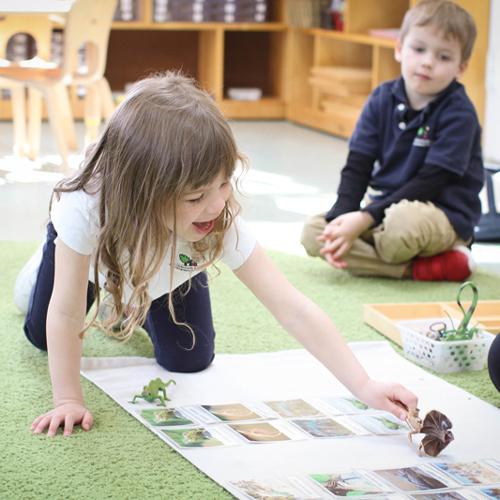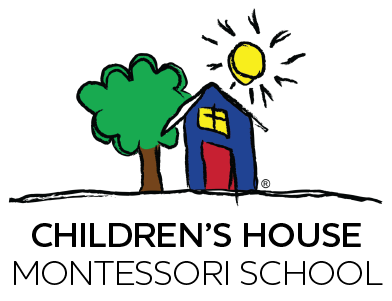Dr. Maria Montessori’s scientific observations are the foundation for her several educational principles that define an authentic Montessori school experience. Eight core themes include: Montessori environment, mixed-age classrooms, Montessori materials, Montessori curriculum, uninterrupted work cycle, freedom within limits, and movement. These elements tie together to create learning experiences that allow children to blossom.

The Montessori environment is a classroom that contains specific Montessori materials and embodies Dr. Montessori’s philosophy of education. Low shelves are strategically arranged throughout the Montessori space with countless individual and small group lessons organized with intention and purpose. Lessons encompass the eight subject areas of the Montessori curriculum and the environment is curated with order and simplicity at its focus.
Mixed aged classrooms are a hallmark of a Montessori education because it creates a sense of community amongst all children, younger and older. Younger students and older students work collectively and collaboratively in the same environment to support and care for one another and act as younger and older siblings to each other. Social and emotional learning amongst all children is accelerated because of this essential principle.
The purpose of trained Montessori Guides is to observe, guide, and support the learning and development of each child with grace and intention. They undergo extensive training and hold either an AMS or AMI Montessori certification, which serves as evidence for their ability to create a safe and positive atmosphere for children to thrive through the Montessori philosophy of education. On a typical day, they present individual and small group lessons to children, and provide them space and time to navigate the lessons at their own pace.
Montessori materials, created by Dr. Montessori herself, are hands-on lessons designed to teach one skill at a time. These materials serve both direct and indirect learning purposes. Organized and introduced easiest to hardest, lessons enable children to practice and master skills before advancing to more complex ones. The simplicity and dynamic nature of Montessori materials engage a child’s attention for an extended period, fostering the development of focus and concentration skills.
Dr. Montessori’s curriculum of education covers six core subjects: Practical Life, Sensorial, Language, Math, Geography, and Science. At CHMS, we include two more vital subjects: Music and Art. Both are essential for a well rounded early childhood education. Each subject includes an intentional sequence of Montessori materials tailored to the child’s current and future capabilities. Our curriculum enables children to progress at their own pace, supported by trained Montessori Guides, which allows them to build a strong academic foundation.
Children participate in a morning work and afternoon work cycle that allows students to independently choose and practice Montessori lessons at their own pace. Meanwhile, Montessori Guides present individual and small group lessons to children, so they can practice lessons with confidence and achieve mastery of targeted skills. The extended period of time creates a warm and peaceful environment that supports a child’s ability to focus and concentrate on lessons that hold their interest.
Children are given freedom within limits in the Montessori environment. This practice fosters autonomy and responsibility in students, while building trust in both the Montessori Guides and Montessori environment. Children learn to experience a sense of ownership in their learning, while also understanding natural limits. Dr. Montessori’s curriculum and philosophy of teaching offers children many opportunities to experience liberties within a boundary that supports their interests and maintains their focus.
Dr. Montessori’s philosophy and curriculum is centered on movement. Children freely navigate the Montessori environment, choosing lessons of their choice and naturally interacting with classmates. They can complete lessons while sitting at a table, on the carpet, or even simply standing. The Montessori philosophy of education and environment facilitates a child’s need to move through the Montessori environment design and lessons that activate fine motor skills and gross motor skills.
